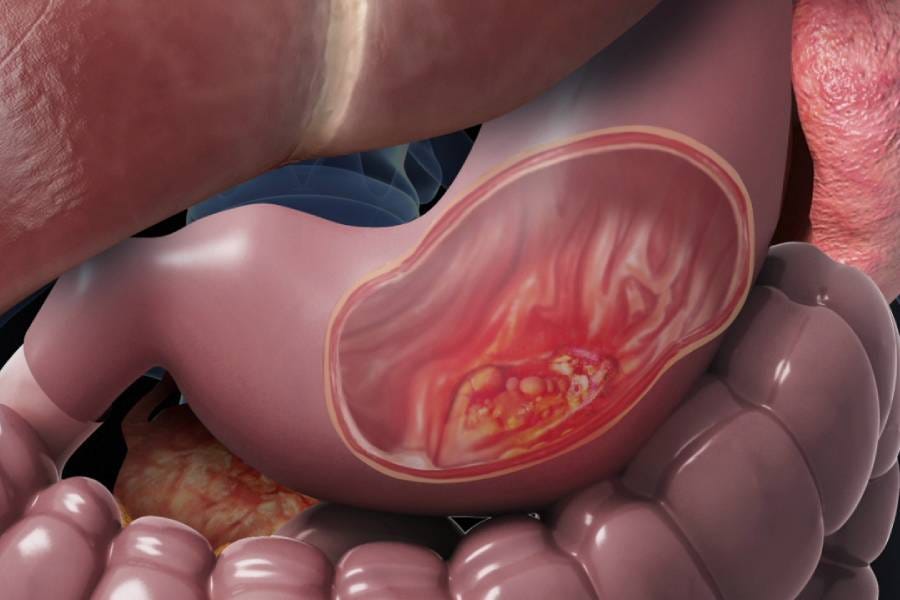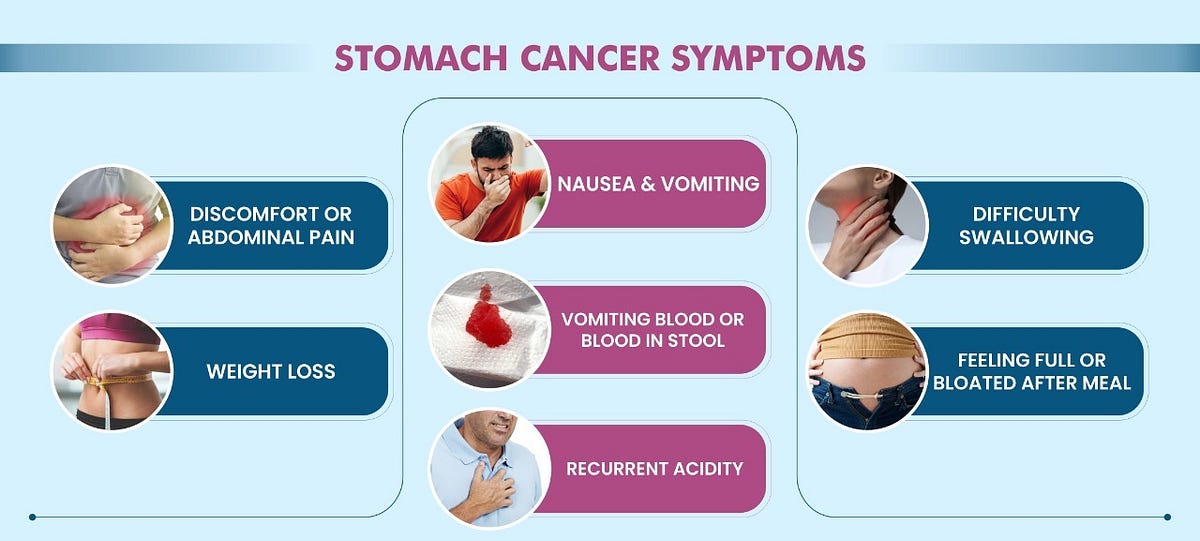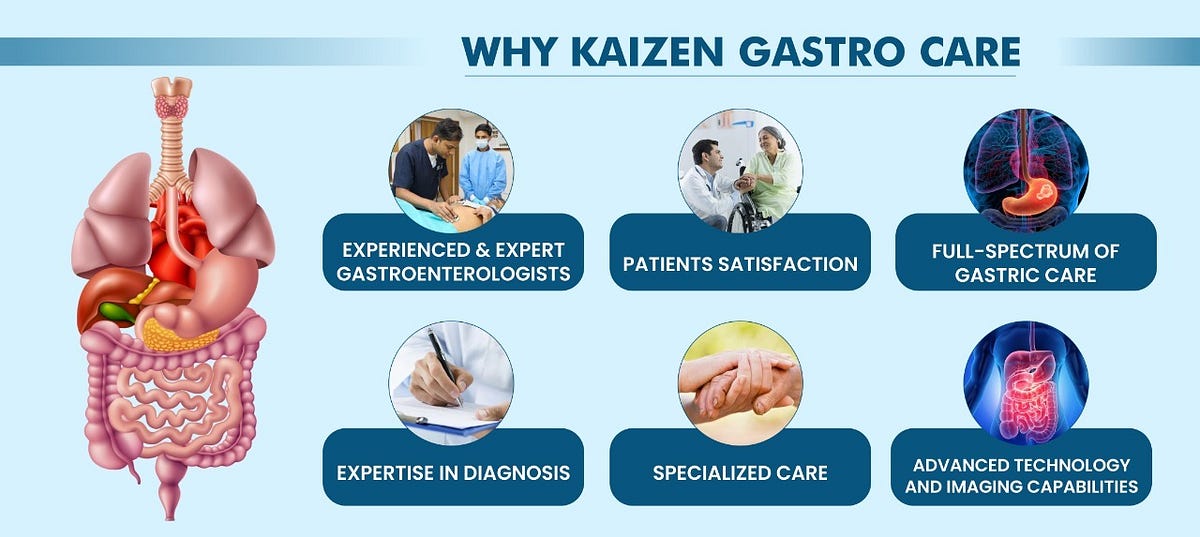Welcome to Kaizen Gastro Care, your trusted destination for exhaustive and compassionate stomach cancer treatment in Pune, Maharashtra. At Kaizen Gastro Care, the best gastroenterology clinic in Pune, Maharashtra, we understand that a diagnosis of stomach cancer can be overwhelming and challenging. We are here to provide you with compassionate care, cutting-edge therapies, and persistent support on your journey to recovery. Our dedicated team of experts is committed to delivering the highest quality stomach cancer treatment in Pune, and we aim to empower our patients with information and hope.

At Kaizen Gastro Care, we diagnose and treat all types of gastric cancer, including stomach cancer, colorectal cancer, Oesophageal cancer, Pancreatic cancer, Liver cancer, Gall Bladder cancer, and Anal Cancer. As well as access to a world-leading Gastroenterologist team, we also offer rapid diagnostics, Cancer Surgery, and after-cancer treatment under one roof.
If you or a loved one is facing stomach cancer, don’t hesitate to reach out to us. Our specialists Dr. Vikrant Kale & Dr. Samrat Jankar, are here to answer your questions, discuss treatment options, and provide the support you need. Contact us today to schedule an appointment or learn more about our stomach cancer treatment options in Pune. Your health is our commitment, and we are here to help you fight cancer with hope and resilience.
Read on as we explore the symptoms and causes of stomach Cancer, and why you might need to see one of our stomach cancer specialists. If you notice any symptoms of stomach cancer, then book an appointment today with our best stomach cancer specialist in Pune.
What is stomach cancer (gastric cancer)?
Stomach cancer is also called gastric cancer. In this cancer cells grow out of control in your stomach. Cancer can originate anywhere in your stomach. Most cases of stomach cancer involve abnormal cell growth in the place where your stomach meets your esophagus (gastroesophageal junction). About 95% of the time, stomach cancer starts in your stomach lining and progresses slowly. Untreated, it can form a mass (tumor) and grow more seriously into your stomach walls. The tumor may extend to nearby organs like your liver and pancreas.
What are the types of gastric cancer?
Gastric cancer, also known as stomach cancer, can be categorized into several types based on various factors, including the location within the stomach and the histological characteristics of the tumor. The main types of gastric cancer include:
- Adenocarcinoma: Adenocarcinoma is the most ordinary type of gastric cancer, accounting for about 90–95% of all cases. It forms in the glandular cells that line the inside of the stomach.
- Gastrointestinal stromal tumors (GISTs): GISTs are rare tumors that form in the interstitial cells of Cajal, which are specialized nerve cells that control muscle movement in the digestive tract.
- Carcinoid tumors: Carcinoid tumors are rare tumors that begin in neuroendocrine cells, which are cells that have both nerve and hormone-producing properties. It is rare and does not normally spread to other organs.
- Lymphomas: Gastric lymphoma is a rare type of cancer that originates in the lymphatic tissue of the stomach. It can be either non-Hodgkin lymphoma or, less commonly, Hodgkin lymphoma.
What are the signs and symptoms of stomach cancer?

Stomach cancer often does not cause apparent symptoms in its early stages. Symptoms may become more noticeable as the cancer advances. However, it’s important to keep in mind that these symptoms can also be caused by other, less serious conditions. Common signs of stomach cancer can include:
- Indigestion or Heartburn
- Bloating
- Indigestion
- Nausea and vomiting
- Loss of appetite
- Unexplained Weight Loss
- Difficulty Swallowing
- Blood in Stool
- Anemia
If you have any of these signs, it is important to see a stomach specialist right away. Stomach cancer is most treatable when it is diagnosed earlier.
What causes stomach cancer?
The exact cause of stomach cancer is unknown. However, lifestyle factors are linked to three in four stomach cancers. These include:
- Being overweight
- Diet — a diet high in pickled vegetables, smoked meats and salt can increase your risk, whereas a high-fiber diet can help protect you
- Smoking/ Alcohol Consumption
Other factors that increase your chances of getting it include:
- Aging
- Bacterial infection with H. pylori — can also cause stomach ulcers, indigestion and inflammation
- Being male — men are twice as likely to develop stomach cancer than women
- Family history
- Having another type of cancer or certain conditions — such as pernicious anemia (which causes a lack of vitamin B12)
- Stomach surgery
If you are at high risk for stomach cancer, such as if you have a family history of the disease or if you are from a resident group with a high incidence of stomach cancer, you may want to talk to your doctor about getting screened for the disease.
Stomach Cancer Diagnosis At Kaizen Gastro Care:
A Stomach Cancer Specialist in Pune, Maharashtra, at Kaizen Gastro Care, performs a series of investigations to confirm the diagnosis and evaluate the stage of the cancer. These are very important steps, as diagnosis type and stage of cancer determine further treatment and survival of the patient. Commonly used procedures to diagnose stomach cancer include:
- Endoscopy — Endoscopy is one of the most common methods used to screen for stomach cancer. During an endoscopy, a thin tube with a tiny camera is passed down the throat and into the stomach to look for the tumor.
- Biopsy of the Tumor — If abnormalities are found during endoscopy or imaging tests, a biopsy is often performed to confirm the diagnosis. During a biopsy, a small tissue sample is taken from the suspicious area and studied under a microscope.
- Endoscopic Ultrasound — done to assess the depth of tumor invasion, required for staging of the cancer.
- Imaging tests — Imaging tests to find the extent of disease, for staging, include a computerized tomography (CT) scan, MRI, positron emission tomography (PET), and a barium swallow.
- Exploratory surgery — Once a decision is taken to operate, exploratory laparoscopy is undertaken to confirm operability.
Stomach Cancer Treatment at Kaizen Gastro Care:
When you are diagnosed with stomach cancer at Kaizen Gastro Care, Pune our team of highly skilled surgeons, gastroenterologists, oncologists, and support staff work together to develop a customized treatment plan tailored to your specific needs. Based on your cancer’s spread, your health the depth of the stomach cancer problem, your treatment may be
- Surgery: Depending on how much cancer spreads, Kaizen expert Dr. Samrat Jankar may recommend surgery to remove precancerous cells, a tumor, or all or parts of your stomach.
- Upper endoscopy: In the early stages, when the cancer is limited to your stomach’s upper layer, cancer can be removed through an upper endoscopy. In this process, Kaizen experts remove cancer cells from your stomach wall through an endoscopy procedure.
- Gastrectomy: Once the tumor extends beyond your stomach’s superficial layers, you’ll need surgery to remove all or part of your stomach. Subtotal gastrectomy removes the part of your stomach affected by cancer. Total gastrectomy removes your entire stomach.
Other treatments:
If your cancer is not treated above methods, then the below direct attack methods are useful for cancer treatment such as
- Chemotherapy: It uses drugs to shrink cancer cells, making them easier to remove before surgery. Chemotherapy can also kill the remaining cancer cells after surgery. It’s usually used in combination with radiation.
- Radiation: It uses targeted energy beams like X-rays to destroy cancer cells. Radiation alone isn’t effective in treating stomach cancer, but it may be used alongside chemo before and after surgery. Radiation can also help relieve symptoms.
- Targeted drug therapy: zeroes in on weaknesses in cancer cells, causing them to die. It’s often used with chemo in cancer that recurs (comes back) or that’s advanced.
- Immunotherapy: It helps your immune system identify and destroy cancer cells that may be hard to detect. It’s most commonly used in recurring or advanced cancer.
We understand that every patient’s journey with stomach cancer is unique. Our team is dedicated to providing sympathetic, patient-centered care throughout the entire treatment process. We strive to not only treat the disease but also support you and your loved ones emotionally and physically.
What are the risk factors for stomach cancer?
- Stomach cancer is more common in older adults.
- Men are more probable to develop stomach cancer than women.
- Stomach cancer is more common in people of Asian and Hispanic descent.
- If you have a family history of stomach cancer, you are at increased risk for developing the disease.
- pylori is a bacteria that can induce ulcers in the stomach. It is also a risk factor for gastric cancer.
- Obesity is a risk factor for stomach cancer.
- Smoking increases your risk of stomach cancer.
- A diet high in red meat, processed meats, and smoked and salted foods may increase your risk of stomach cancer.
Stomach cancer is usually preventable, and early detection is key. If you have any of the symptoms of stomach cancer, consult with a stomach specialist in Pune, Maharashtra.
How can I prevent stomach cancer?
There are several things you can do to prevent stomach cancer, including:
- Eat a healthy diet: Eat plenty of fruits, vegetables, and whole seeds. Limit your intake of red meat, processed meats, and smoked and salted foods.
- Don’t smoke: Smoking raises your risk of stomach cancer and many other types of cancer.
- Maintain a healthy weight: Obesity is a risk factor for stomach cancer.
- Get tested for H. pylori: pylori is a bacteria that can cause ulcers in the stomach. It is also a risk element for stomach cancer. If you have H. pylori, your doctor can treat it with antibiotics.
If you have a family history of stomach cancer or other risk factors, such as chronic gastritis or pernicious anemia, talk to kaizen experts about ways to reduce your risk.
Here are some additional tips for preventing stomach cancer:
- Avoid secondhand smoke.
- Get regular exercise.
- Manage stress.
- Limit alcohol consumption.
By following these tips, you can help lower your risk of developing stomach cancer.
Why Choose Kaizen Gastro Care for Stomach Cancer Treatment:

- Patient-Centric Approach: Your well-being is our top priority, and we strive to make your journey as comfortable as possible.
- Experienced Team: Our team of medical experts has a proven track record in successfully treating stomach cancer cases.
- Advanced Technology: We invest in the latest medical technology to provide accurate diagnoses and adequate treatments.
- Compassionate Care: We understand the emotional and physical challenges you may face during your cancer journey. Our compassionate team is here to help you every step of the way.
- Innovative Treatment Options: Kaizen Gastro Care is dedicated to staying at the forefront of medical advancements, assuring that you have access to the latest and most effective treatments.
- Convenient Location: Located in Pune, our facility is easily accessible, making it convenient for patients and their families.



